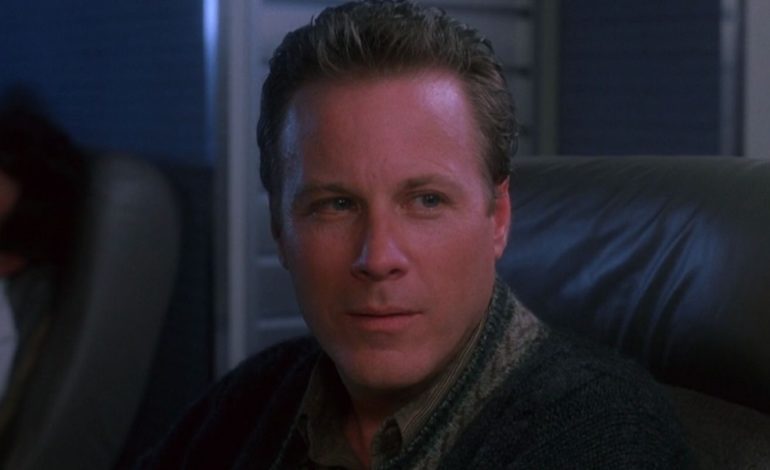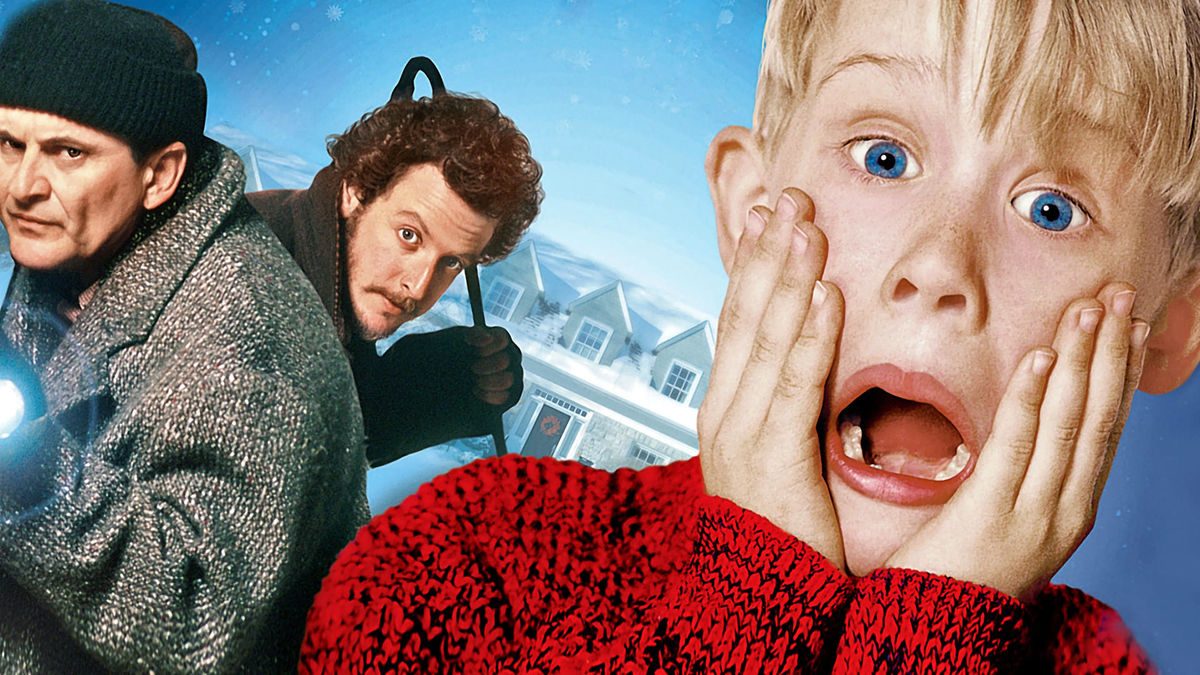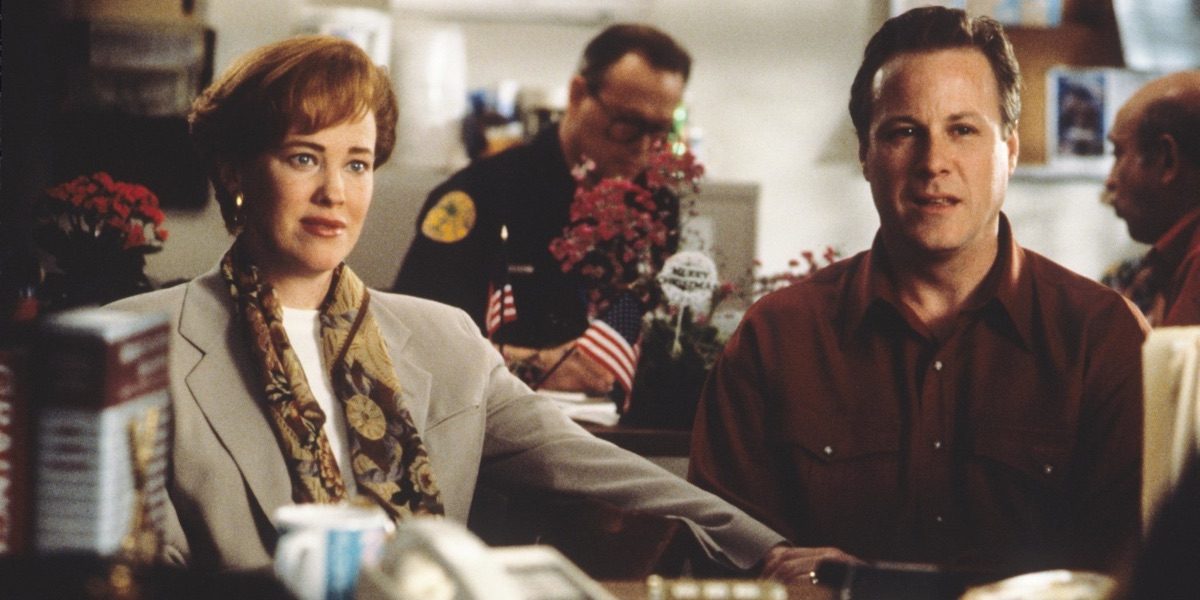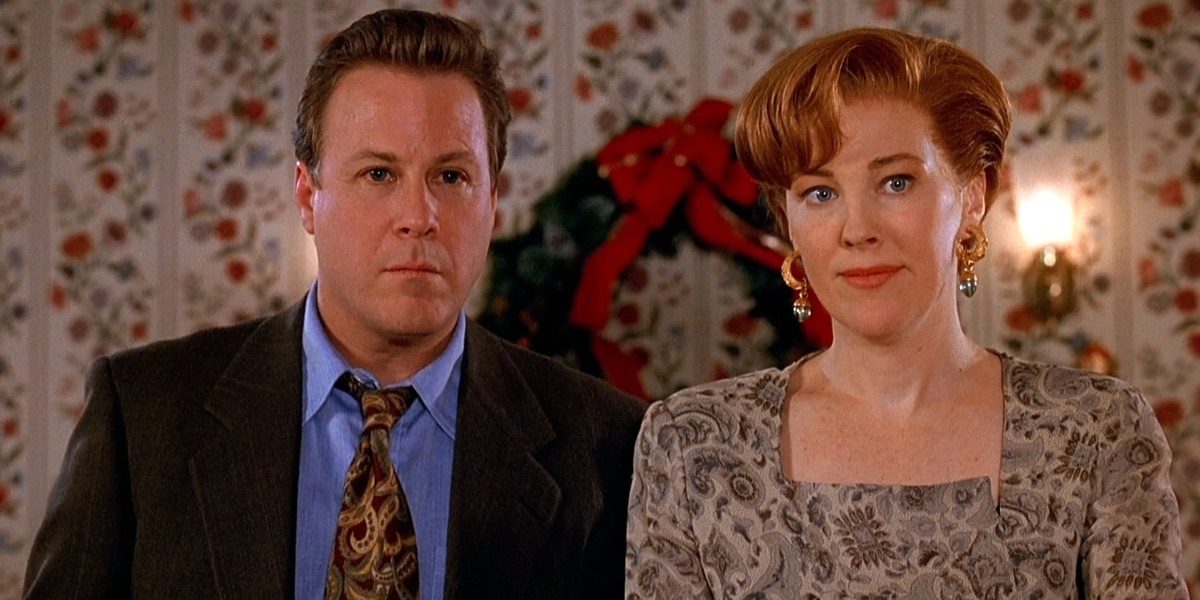

Home Alone and Home Alone 2: Lost in New York, one is a staple of the holidays, and the other is quietly loved by all, whether they’ll admit it or not—don’t lie, you know you’ve seen it multiple times and likely watch it every year. The Home Alone duology is responsible for bringing Macaulay Culkin into superstardom, but despite his name being on all the posters, a massive part of their appeal comes from the side characters and supporting roles, from as high up as Joe Pesci and Daniel Stern as Harry and Marv, Catherine O’Hara as Kate McCallister—proving time and again that she’s perfect at everything—down to the smaller parts that are spread throughout the two films’ runtimes.
Even if you haven’t watched the films in a while, you remember the little characters sprinkled throughout, such as the smoking Santa Claus who gives Kevin tic-tacs, the cashier who hassles him at the grocery store, and the band leader of a polka band, played by John Candy, who once again perpetuates the theory that he’s the result of a lab experiment to find out what would happen if a collection of teddy bears were spliced with Second City training and became a sentient being. We don’t have time to list off everyone in Home Alone 2, but if you were given anecdotal evidence that Chris Columbus and John Hughes made the movie purely as an excuse to work with Tim Curry, would you even bother to look it up to verify?


Amidst all of these over-the-top and memorable characters, the one who often gets overlooked is the performance of John Heard—not to be confused with John Hurt or William Hurt, which is a universal mistake everyone makes, right?—as Peter McCallister, aka Kevin’s Dad. It’s easy to get lost in the shuffle, considering the McCallister family is notoriously massive, but while each of the family members like Kevin’s siblings, cousins, Mom, Uncle Frank—not so much his Aunt, whose name you probably don’t even remember—have their memorable moments of ganging up on an eight-year-old, Kevin’s dad is just that…a dad.
Everyone else has these weird grudges against Kevin, except for his cousin Fuller, who takes weird joy in how he wets the bed, especially when he knows he’s going to share it with someone else; Peter is played totally straight and is the only normal person of the bunch. Character-wise, he doesn’t have much to do, especially compared to O’Hara, and he’s pretty inconsequential to the plot, which would run the risk of him coming across as underwritten and end up not leaving much of an impression, but when you rewatch these movies over the holidays—potentially multiple times—Heard is just so wonderful and absolutely nails playing a typical, dorky dad.
For his minimal screen time, what helps Heard leave a positive impression is he’s basically the only member of the family who doesn’t lay into Kevin any chance he gets. Based on the dynamic between him and O’Hara, you get the impression that she’s the one who doles out the punishment, while he’s more the pushover, considering early on when Kate totally snitches on Kevin about using his dad’s new fish hooks to make ornaments, Peter’s response could be summed up as mildly inconvenienced, leaning into almost annoyed. The harshest thing he does in both films is dryly telling Kevin to go to his room, and that’s always done without malice. Before that, when Kevin causes all the mayhem with the pizza, and everyone glares at him—likely fantasizing about the endings to My Girl and The Good Son and pondering why they couldn’t be so lucky—Heard barely stares at him and is the only one who just looks disappointed.


Kevin seems aware of this, considering he never badmouths his dad behind his back or loudly mocks him the same way he does when he eats ice cream and watches Angels with Filthy Souls (the greatest movie that doesn’t exist) or goes through Buzz’s stuff. When he has the moment where he has to deal with the moral consequences of banishing his entire family into the void, or wherever he believes he sent them all, he thinks about all the mean things his family said to him—which is funny in retrospect when you notice he remembers them being way more malicious than they actually were—his dad isn’t one of them. Later on, when Kevin’s talking with Old Man Marley (Roberts Blossom) in the church, and Marley professes his fears about his son not wanting to talk to him, Kevin says, “I don’t care how mad I was, I’d talk to my dad, especially around the holidays.” That’s one of the only positive direct remarks he makes about his family in the entire film, and it’s about his dad, implying that out of everyone in the family, he’s the only one that Kevin has a consistently positive dynamic.
Besides all that, John Heard’s performance never gets enough credit for how naturally likable he is. Across the two films, he plays up the role of a normal dad, contrasting the heightened state of the rest of the family. He reacts rationally and is the most lighthearted of the lot. He makes dad jokes, like when Kate is stressing about forgetting something and asks if she turned off the coffee, he replies, “No…I did.” It’s not the joke that makes the moment memorable; it’s the fact that he smiles so big right after and looks so proud of himself for the comment. Do you think after saying that, he thought to himself, “No matter what happens for the rest of this flight, today is going down as one of the good ones. I’d give my youngest son to remember that moment forever, but let’s not tempt fate.” He has a similar moment in Home Alone 2 when Kevin explains he can’t go in the bathroom to grab his tie because Uncle Frank is taking a shower, “He says if I walked in there and saw him naked, I’d grow up never feeling like a real man. Whatever that means.” The slight pause and quick laugh Peter gives as a response is so perfectly timed that it wouldn’t be surprising if that was John Heard’s actual response to hearing Macaulay Culkin say the line.
Back in the original film, by the time you get to the final moments when the whole family manages to be together for Christmas, it also cements the drastically different stories Peter and Kate went through based on how they interact with Kevin. Kate experienced an abridged version of Planes, Trains and Automobiles, down to her being partnered with John Candy for most of the journey, so when she sees Kevin on Christmas morning, it’s a heartwarming moment between mother and son that feels earned. Then, when Peter walks in approximately twenty seconds later with the kids after a long flight and annoying shuttle home, he responds accordingly, gives Kevin a quick hug, and talks to him like a dad who hasn’t seen his son in a few days, “Kevin! Kevin, my boy. Good to see you.” That is the most dad response to leaving your son home alone (roll credits), and he owns it.


The last thing to bring up, and admittedly, it’s not really relevant to John Heard’s performance or how he’s written, but what exactly do he and Kate do for a living? Take away the fact that it’s a John Hughes-written movie, so naturally, the main characters have no self-awareness that they’re loaded—in Uncle Buck, the family had to move into a McCallister-sized house in the Chicago suburbs because they couldn’t afford to live in Indianapolis anymore, so what did their old house look like if their current one is a downgrade? Not important. Anyway, the McCallisters live in a massive house that can support a family of seven and has the capacity to hold an additional seven family members for an undisclosed amount of time. In the sequel, they supply all of the plane tickets for the family—excluding Heather, who’s probably still in Paris—with four of the tickets being first-class, and then pay an additional set of tickets days before Christmas to fly to New York to get Kevin. Speaking of planes, remember in the first film when they’re trying to think of ways to feasibly get from Paris to Chicago, and Kate has the idea of booking a private plane? Not even as an emergency option; she has a tone like that was the obvious backup plan. Do they have money stashed away off-shore? In what reality is a transatlantic flight on a private plane a financially realistic option to get home? Maybe Peter and Kate are as wealthy as Richard and Regina Rich; they’re just comparatively more subtle about it.
Kind of got lost in the weeds there, but you notice things when you rewatch something (or two somethings) hundreds of times. Regardless, John Heard will likely be remembered forever as the dad from Home Alone, and there are worst fates to be condemned to. He’s also great in Martin Scorsese’s After Hours, where he has a small role that’s most noteworthy for him having a brawl with a faulty cash register that has clearly forgotten its place in life. But anyway, however minor his role is in the Home Alone series, he brings a necessary grounding to the family and the required amount of self-awareness that keeps them from coming across like a bunch of cartoon characters. What could’ve otherwise been an underwhelming and ultimately forgettable character is elevated by his natural affability and aptitude to be a believable everyman. He’s just a guy trying to survive the holidays with his traveling circus of a family, and we love him for it (and so should you).
